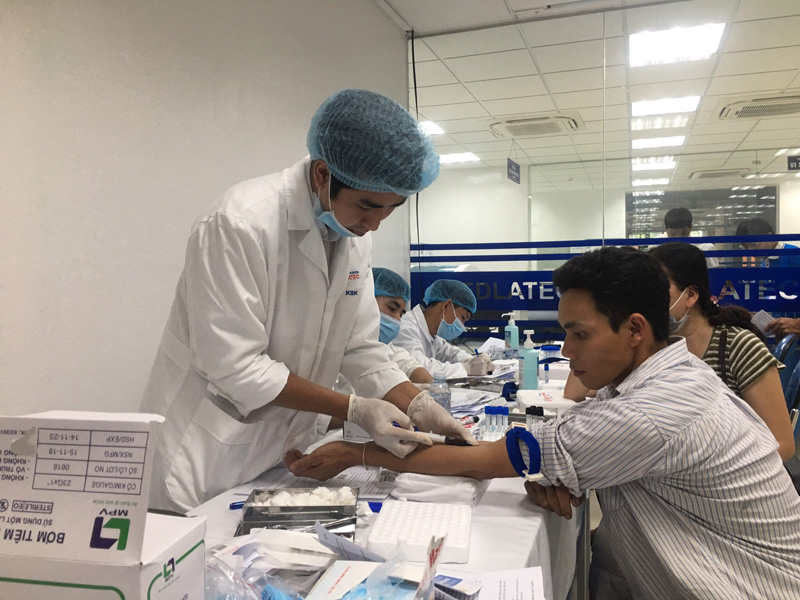
(HBO) – Thalassemia is the most common inherited blood disorder, causing heavy consequences for both the patients and their families. Hoa Binh province has a high rate of people carrying out the disease in their genes.

Locals are being tested for thalassemia.
To screen for and manage the disease, the province has taken
several measures, including communications work to raise people’s awareness on
pre-marriage health checkup and consultation, and antenatal health screening.
Hoa Binh has teamed up with Medlatec hospital to run a programme on thalassemia
screening and management. In 2017, the hospital collaborated with the
provincial Health Department to offer free screening tests for mutated
thalassemia gene to 543 residents in Cao Phong district’s Yen Lap and Yen
Thuong communes, with 35.1 percent of whom or 191 people found to be likely to have
such gene.
In August 2019, Medlatec continued working with the
department and the Hoa Binh General
Hospital in launching a
large-scale screening programme. Accordingly, the hospital spent 3 billion VND
on free screening tests for 2,000 locals. Besides blood tests, residents were
also equipped with knowledge on the disease and given consultation after
receiving test results.
In the coming time, to step up its efforts, Hoa Binh needs
to continue replicating thalassemia-related preventative models across
districts and cities. Awareness-raising campaigns are also necessary to help
the public understand the disease and benefits of early screening. The health
department is recommended to run professional training courses on thalassemia
detection, treatment and patient management for medical workers in district-
and provincial-level health facilities./.
More than just an information technology teacher, Bui Van Nien is an inspiring figure who has nurtured the scientific curiosity and creative spirit of students in Vietnam’s ethnic minority communities.
Da Bac is the most disadvantaged mountainous district in Hoa Binh province, with ethnic minorities accounting for about 90% of its population. Over the past years, the district has mobilised resources to implement ethnic policies to improve the quality of life of local people.
In recent years, Hoa Binh province has consistently prioritised the protection, care, and education of children, particularly those from ethnic minorities and disadvantaged backgrounds, by creating a safe, healthy, and nurturing environment for their all-round development.
The Steering Committee for Tobacco Harm Prevention and Control of Hoa Binh province, in coordination with the Tobacco Harm Prevention and Control Fund, held a ceremony on May 28 in response to the World No Tobacco Day (May 31) and the National No Tobacco Week (from May 25 to 31). The event was chaired by Nguyen Van Toan, Standing Vice Chairman of the provincial People’s Committee and head of the Steering Committee.
Since 2021, the Center for Industrial Promotion and Industrial Development Consulting (CIIDC) under the Department of Industry and Trade has been implementing a school lighting model as part of the plan for using energy efficiently and economically in Hoa Binh Province in the pẻiod of 2021 - 2025. This model not only aims to improve the learning conditions and enhance the education quality, but it also promotes the message of energy saving, energy security, environmental protection and contributes to the goals of socio-economic development.
In the 2024 - 2025 school year, the entire Hoa Binh provincial education sector includes 520 educational institutions and schools. Among them are 13 ethnic boarding schools with 153 classes and 4,487 students. Four of these schools have met national standards, reaching 30.7 percent.



